When I decided to write lesbian fiction, I never had any doubt that it would be medical romance. Why? Because it’s by far my favorite subgenre. And it seems I’m not alone in my reading preference. Every year great medical romances are published, and some of these books count as my all-time favorites: L.A. Metro by RJ Nolan, Fated Love by Radclyffe, and Ask, Tell by E.J. Noyes, just to name a few. Medical shows on TV are successful, sometimes running for years like ER, Scrubs, or Grey’s Anatomy.
What they all have in common is that they show us a glimpse into a world we usually only visit as outsiders, hopefully just in passing. Most people don’t want to spend more time in a hospital than necessary. Not only do these books and shows reveal hidden layers of passion and humanity, but they also do so from the safe haven of our homes.
But I’m no outsider. I get my daily dose of reality at work. But most of what I do or see wouldn’t make it into a medical romance.
Writers leave out all the boring parts. No one wants to read about hours of paperwork or watch the tenth gallbladder removal in a row. They concentrate on unusual events, even improbable. All too often they cross into impossible. We see depictions of super-heroic actions that are way above the skill and experience levels of the protagonists. Often they are irresponsible and would get anyone fired.
When my wife and I started dating—or as we called it “being really good friends who snuggle on the sofa”—we bonded over watching re-runs of ER. We discussed the medical parts and got mad when something was unrealistic or even completely false. But we didn’t return to the show daily because of the medical parts. We loved the characters, the storylines, the feelings we could relate too.
When I started writing, I forgot about that. The switch from a medical professional to romance writer wasn’t easy.
Keeping the Good Stuff, Dissecting the Rest
In my debut novel, Irregular Heartbeat, I wrote a scene where Diana, an ex-drummer-now resident in the ER, had to save the life of a woman who had overdosed on opioids. My first version was super realistic. Everyone spoke in medical terms and abbreviations. I gave a step-by-step account of everyone’s actions, even specifying what they did with which hand.
It probably could have worked as a textbook on how to treat an overdose and how to intubate a patient.
Not at all helpful if you want to write a romance.
The goal of the scene was not to show off how good my medical knowledge was. Or how good the medical education of my character was.
I wanted to show the readers that Diana stayed calm under pressure, even when it got personal.
So I deleted all the details, stripped the scene to its bare bones, and added layers of emotions, something readers can relate to. I found a compromise between authentic language and over-explaining everything.
And I guess that’s what all the writers of medical romance or drama do: they focus on feelings and add just enough medical details to give it the appearance of authenticity. Sometimes these details are well researched. Sometimes—not so much.
But does it matter? Medical staff all over the world groan when yet another flatline is shocked. (Side note: Don’t do that. You can’t shock a flatlining heart back to life. It doesn’t work that way. Believe me, I’ve tried. And don’t talk to me about the movie Flatliners.)
Non-medical audience probably doesn’t care as much as we do. But I still have the ambition to get it right.
Love in the Time of Surgery
But what about the other part of a medical romance? The sometimes over-the-top human behavior that seems completely unrealistic? Like the dozens of affairs, the quickies in the on-call room or storage closet, the repercussions of the personal drama on the career or even patient care?
I’m sorry to say, not unrealistic at all. One colleague was famous for breaking three beds in on-call rooms in two hospitals. I briefly worked with a senior psychiatrist who had been married nine times, always to fellow doctors or nurses, and six of his ex-wives were still working at the same hospital. Another colleague had a breakdown at work because he learned about his partner’s affair with the chief of surgery. I talked to a very pregnant doctor who admitted quite openly that she didn’t know which of her two colleagues was the father of the baby, but she was certain it wasn’t her husband. I witnessed several not-so-secret relationships developing and breaking.
And I’m not better than anyone else: I met my wife at work, during a resuscitation. Later, we tried to have a discreet relationship. But we had to find out that we weren’t as inconspicuous as we thought. The nurses had a betting pool on when we would get together (not if).
So, it’s pretty safe to say: whatever unrealistic, improbable human behavior writers come up with, it has already happened at a hospital somewhere and will happen again.
And we will all love to read about it. As long as no-one shocks a flatline.
Chris Zett is the author of two lesbian medical romances: Irregular Heartbeat and Heart Failure. When she isn’t working on the ICU, she loves to read, write, and travel.


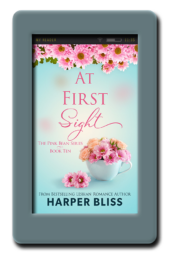 At First Sight by Harper Bliss
At First Sight by Harper Bliss 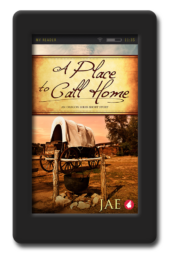 A Place to Call Home by Jae
A Place to Call Home by Jae 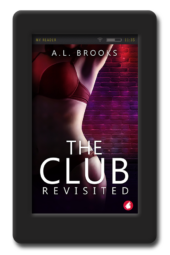 The Club Revisited by A.L. Brooks
The Club Revisited by A.L. Brooks 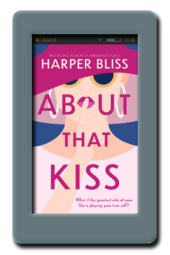 About That Kiss by Harper Bliss
About That Kiss by Harper Bliss 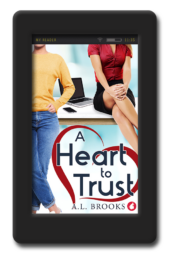 A Heart to Trust by A.L. Brooks
A Heart to Trust by A.L. Brooks 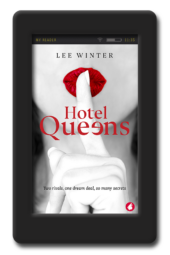 Hotel Queens by Lee Winter
Hotel Queens by Lee Winter 

Love this. But I’m more askance by the flatlining-shock factoid than Mr Nine Marriages! Say it ain’t so!
Recently finished Heart Failure and really enjoyed it. Medical based books are one of my favorite genres. Selfishly, I hope you’re hard at work on another book.
I re-read the OD scene – it was a perfect balance between emotions and doctor talk. The attention to detail, like fatiguing from holding the mask on, was what made it authentic for me.
As far as resuscitation goes, in my very first life support class the instructor began with: “You know all the movies where the patient flatlines and they shock them to life?” The entire room full of young aspiring physicians eagerly nodded. “Yeah, we don’t do that.” Needless to say, I was shocked.
Finding flaws in medical drama is definitely my guilty pleasure. Meredith Grey breaking sterility and touching her face during a surgery is probably the main reason I keep watching Grey’s Anatomy. Obviously, reading the work of a doctor makes it challenging to indulge my guilty pleasure. I suppose a well-crafted doctor scene can be just as rewarding. Besides, the cath lab is close to my heart so Heart Failure is definitely on my to-read list 😉
Good blog. Love your books! as for the over-the-top human behavior. Nothing you described can’t be found in retail stores, factory floors and offices, bIg and probably small corporate offices. I’ve seen things in those places that might actually top anything you described so why wouldn’t it happen in a hospital. Medical workers are just people too. I’ll give one example that are watched.
Retail store. Male, married store manager having affair with much older female head checker that was so blatant even the customers new about it. The office for customer assistance, right inside the door was higher than the store floor and a customer supposedly came up to the window and saw the manager standing in the back of the office with the head checker on her knees in front of him. Another checker was having an affair with a delivery guy. When I resigned to go work in a factory 2nd shift one of the dept. heads said I shouldn’t take that job because I would see and hear things I was too young be exposed e to 🙀. I was 18 at the time so I just told him I couldn’t see or here anything there I hadn’t already seen or heard here.
I’ve seen things and been told about things by people I’m related to or trust not to embellish too much that are so unbelievable they’d never make it into a novel. Three of those I’d love to put into a novel but I’m not a writer and they were so long ago I’ve forgotten most of the details.
What I find over-the-top in some stories are the super-hero type physical abilities when a character manages to single-handedly beat the bad guy even after being shot/knifed/falling down a flight of stairs. But it still makes for a good story.
Keep writing please. I’m watching for your next book.
Enjoyed this so much! It always fascinates me to learn about writers ‘ struggles between accuracy and fiction, and how much technical detail to include or leave out. Fascinating.
There are some books that are a bit hard to read because the writer seems engrossed in getting the detail spot on, and can take away from the story. It’s interesting to see your perspective on this, and thought both your books had a great balance of medical information that enhanced the story, but didn’t take the reader away from the room. Well done! And sounds Like you have a potential gold mine of content to pull from your workplace 😂👍